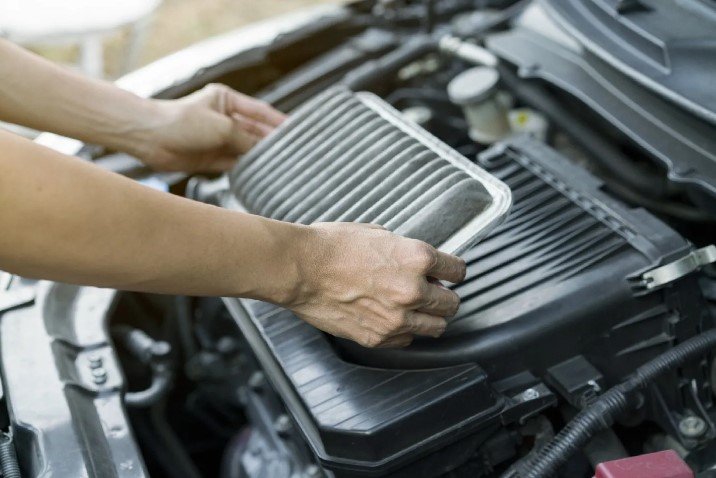
Air Filter Change in Cars: A Vital Maintenance Task

When it comes to maintaining your car’s engine performance and prolonging its lifespan, regular air filter changes are a crucial aspect often overlooked by many car owners. Your car’s air filter plays a significant role in ensuring that only clean air enters the engine, preventing dust, dirt, and other contaminants from causing damage. In this article, we’ll delve into the importance of air filter changes, signs indicating when it’s time for a replacement, how to perform the replacement yourself, and much more.
Signs Your Car’s Air Filter Needs Changing
One of the first indicators that your car’s air filter needs changing is a decrease in fuel efficiency. A clogged air filter restricts airflow to the engine, leading to a rich air-fuel mixture and increased fuel consumption. Additionally, reduced engine performance, rough idling, or difficulty starting the engine are signs that the air filter may be dirty and in need of replacement.
How Often Should You Change Your Car’s Air Filter?
The frequency of air filter changes depends on various factors such as driving conditions, vehicle make and model, and environmental factors. As a general rule of thumb, it’s recommended to inspect the air filter every 12,000 to 15,000 miles and replace it if necessary. However, if you frequently drive in dusty or polluted environments, more frequent replacements may be necessary.
Steps to Change Your Car’s Air Filter
Gathering Necessary Tools and Supplies
Before you begin, ensure you have the required tools and supplies, including a new air filter, a screwdriver or socket set, and a vacuum cleaner.
Locating the Air Filter
Refer to your car’s owner’s manual to locate the air filter housing. In most vehicles, the air filter is housed in a rectangular or cylindrical plastic casing near the engine.
Removing the Old Air Filter
Carefully open the air filter housing and remove the old air filter. Take note of its orientation to ensure the new filter is installed correctly.
Installing the New Air Filter
Insert the new air filter into the housing, ensuring it fits snugly and securely. Make sure the filter is positioned properly, with the airflow arrow pointing in the direction of the airflow.
Reassembling and Testing
Close the air filter housing and secure it in place. Start the engine and listen for any abnormal noises or vibrations, indicating improper installation. Take your car for a test drive to ensure everything is functioning correctly.
Benefits of Regular Air Filter Changes
Regular air filter changes offer several benefits, including improved engine performance, increased fuel efficiency, and reduced emissions. Additionally, a clean air filter helps prolong the life of the engine by preventing dirt and debris from entering sensitive components.
Consequences of Neglecting Air Filter Maintenance
Neglecting air filter maintenance can lead to a host of problems, including decreased engine performance, reduced fuel efficiency, and potential damage to engine components. Over time, a clogged air filter can cause engine overheating and premature wear and tear.
Different Types of Air Filters for Cars
There are several types of air filters available for cars, including paper, foam, cotton, and synthetic filters. Each type has its own set of advantages and disadvantages, so it’s essential to choose the right filter based on your driving habits and vehicle requirements.
Tips for Choosing the Right Air Filter for Your Car
When selecting a new air filter for your car, consider factors such as filtration efficiency, airflow restriction, and durability. It’s also essential to choose a filter that is compatible with your vehicle’s make and model to ensure proper fit and function.
DIY vs. Professional Air Filter Replacement
While changing your car’s air filter is a relatively straightforward task, some car owners may prefer to have it done by a professional mechanic. DIY replacement can save you money on labor costs, but if you’re unsure or uncomfortable performing the task yourself, it’s best to leave it to the experts.
Cost of Air Filter Replacement
The cost of air filter replacement varies depending on the type of filter and whether you choose to do it yourself or have it done by a professional. On average, the cost of a new air filter ranges from $10 to $50, with additional labor costs if you opt for professional installation.
FAQs About Air Filter Change in Cars
- How often should I change my car’s air filter?
- The frequency of air filter changes depends on various factors, but it’s generally recommended to inspect the filter every 12,000 to 15,000 miles.
- Can a dirty air filter affect my car’s fuel efficiency?
- Yes, a clogged air filter can restrict airflow to the engine, leading to decreased fuel efficiency and increased fuel consumption.
- Is it necessary to replace the air filter if it looks clean?
- Yes, even if the air filter appears clean, it may still be clogged with microscopic dirt and debris that can affect engine performance.
- Can I clean and reuse my car’s air filter?
- While some air filters are washable and reusable, most are designed for single use and should be replaced when dirty.
- What are the consequences of neglecting air filter maintenance?
- Neglecting air filter maintenance can lead to decreased engine performance, reduced fuel efficiency, and potential damage to engine components.
Conclusion
Regular air filter changes are essential for maintaining your car’s engine performance and prolonging its lifespan. By following the steps outlined in this article and adhering to recommended maintenance intervals, you can ensure that your car’s engine continues to run smoothly and efficiently.




